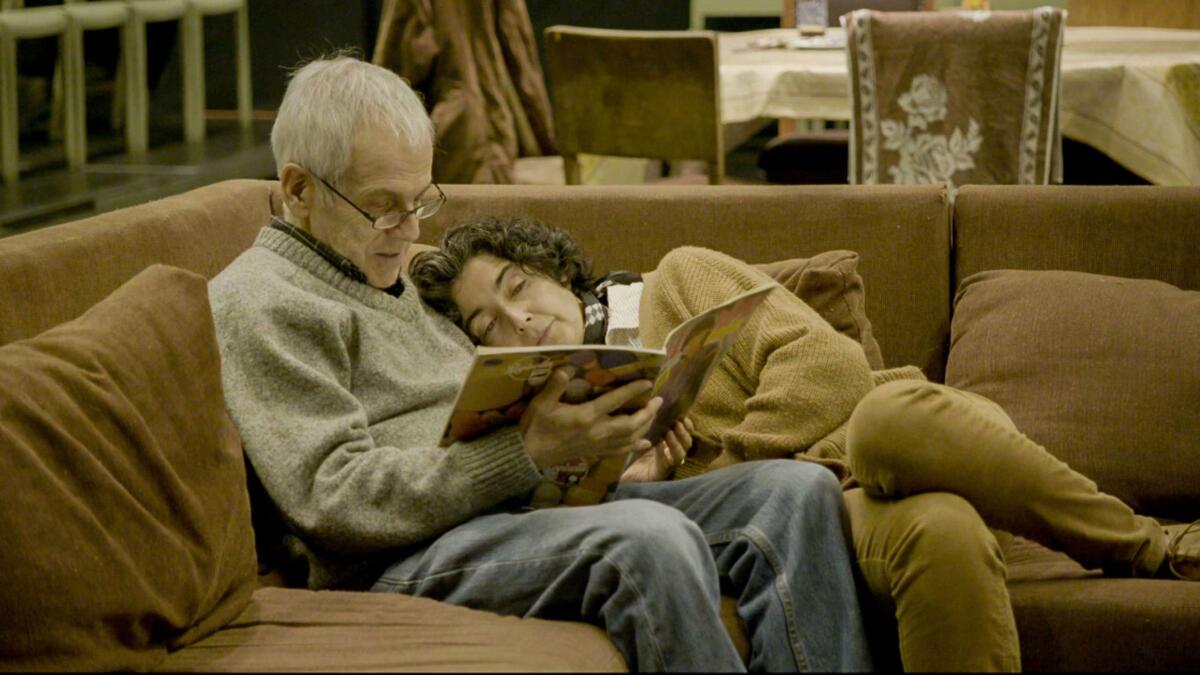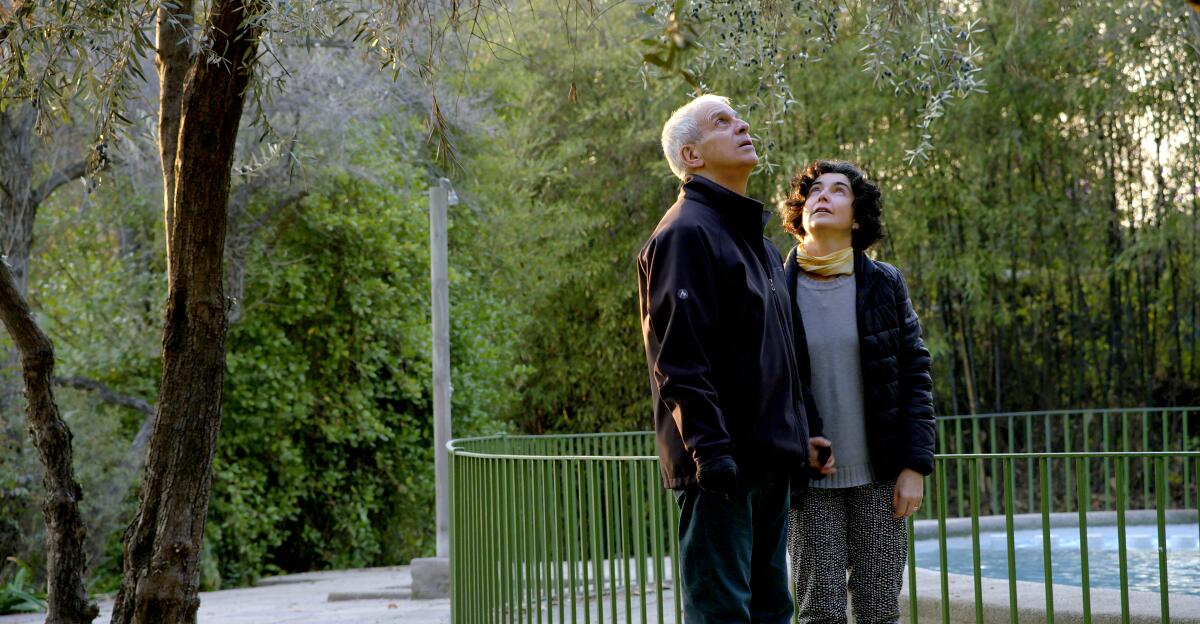In documentary ‘The Eternal Memory,’ a couple beset by Alzheimer’s hangs onto love

- Share via
Paulina Urrutia and Augusto Góngora, the couple at the center of Chilean filmmaker Maite Alberdi’s heart-piercing and unforgettable documentary “The Eternal Memory,” exhibit the type of playful togetherness we imagine is at the root of all enduring romances: laugh-filled exchanges, smiling eyes that always find each other, hand-in-hand walks, comforting embraces.
There’s a poignancy, however, to this enviable slow dance: an Alzheimer’s diagnosis that is stripping away Augusto’s mental faculties, transferring the weight of their combined memory and the daily work of meaningful engagement onto Paulina. Yet the painful reality of a deteriorating condition never seems to affect the strength of their 20-plus-years bond, even as we know one of the colors in this dual portrait is fading.
Equally miraculous is a nonfiction movie forged in the direst of challenges that never comes across like an issue-driven medical narrative. Alberdi’s beautiful meditation has the viewer’s anatomy in its sights: touching the heart, activating the mind, working its way into our bones. If her previous film, the Oscar-nominated (and also age-themed) “The Mole Agent,” began as a comic documentary only to reveal itself as an examination of loneliness, “The Eternal Memory” — an award winner at Sundance — is a disease-of-the-week movie that’s actually about the imperviousness of a great love, especially at its most vulnerable.
Further deepening it all is that this is a very Chilean story too, starring two of the country’s more recognizable figures, even if, as a sweet, affecting opening piece of bedroom video shows, one of them needs gentle reminding of who they both are. During the years of Pinochet’s dictatorship, Augusto had been a valuable underground journalist bravely covering citizens’ hardships under the regime; after democracy arrived in 1990, he segued to cultural programming on public television as a respected director and presenter. The sorrows of the dictatorship seem never far from Augusto’s consciousness, as one wrenching moment shows when he watches protest footage, and his wife turns these loose ribbons of memory into a chance to recall a murdered friend.

A vital presence with a face as open as her husband’s, Paulina is both a celebrated actor and a political stateswoman who served as as Chile’s first Minister of Culture. (They married in 2016, two years after Augusto’s diagnosis but nearly 19 years after they’d fallen in love.) Her dedication to her husband, and pleasure in his moments of adoring lucidity, is a transfixing grace. When she rehearses a play, he’s at the theater too, yet it never smacks of a caretaking decision. It’s valuable time together. Their happiness could be that of a new couple, not one making the most of what’s left.
With the onset of COVID, though, the simple elegance of cinematographer Pablo Valdés’ observational camera is replaced by Paulina’s more intimate, occasionally blurry home recordings, and Augusto’s fragility becomes more pronounced. When she reiterates how he’s loved, that he’s not alone, it feels very much like a mantra to bolster herself too, knowing what’s going away. In this atmosphere, an interstitial shot of diffuse sunlight peeking through towering trees suddenly feels thick with melancholy as well as momentary beauty. (The lilting score by Miguel Miranda and José Miguel Tobar is another expressive thread.)
Toward the end of the film, Paulina reads aloud to Augusto an eloquent passage he once wrote on how essential it is for Chile to remember its past — emotionally, painfully, honestly — in order to continue its progress: “Without memory, there is no identity.” Truer words for hard times anywhere were never more aptly put. And yet what rings truest and richest about “The Eternal Memory,” as exquisitely humane a film as you’re likely to see all year, s what abiding love and stewardship look like in the moment: to care so deeply for someone as to tend to their memories, and to be loved so deeply that it’s the last beautiful thought one may ever need.
'The Eternal Memory'
Not rated
In Spanish with English subtitles
Running time: 1 hour, 24 minutes
Playing: Laemmle Royal, West Los Angeles; Laemmle Town Center 5, Encino
More to Read
Only good movies
Get the Indie Focus newsletter, Mark Olsen's weekly guide to the world of cinema.
You may occasionally receive promotional content from the Los Angeles Times.









